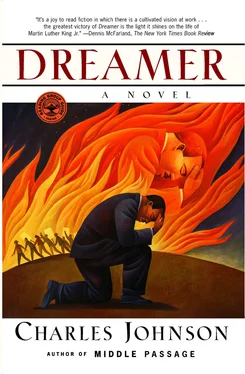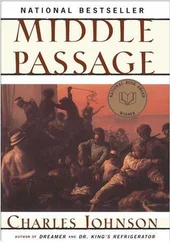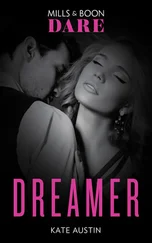Yes, he knew the South. The North, of course, was another matter. Northern cities, he was ready to believe, were, as the Book of Genesis claimed, the products of Cain. Mercifully, they were behind him for another weekend.
And now the stewardess was moving his way, struggling with the editions it would take him over an hour to individually sign for her loved ones. Joints in his fingers would throb, he’d have to soak his hand later in a pan of hot water, as he often did after standing in receiving lines and pressing the flesh with thousands of admirers. And that was just all right. As Abu Sa‘id, an Islamic scholar he admired, might put it, there was nothing inside the blue coat and skirt Stephanie was wearing except Allah.
We stayed on State Route 51 south from Carbondale, following a map Amy scrawled on the back of SCLC stationery as Smith did impersonations of the waitress Arlene and the old man in the Pit Stop. He was a remarkably talented mimic, I realized during the rest of the ride, and so scathingly funny in his interpretations that even while Amy and I laughed until tears cascaded down our cheeks, which helped me forget for a while my shame at the damage I’d done to the diner (every police car we passed made me squirm down in my seat), I was afraid to think of Smith applying his imitative skills on me . The possibility of seeing things as he did, from the oblique angle of alienation, fascinated and frightened me at the same time; he was so antithetical to King, yet in some ways I saw in Smith the distillation of the minister’s message to a black student he met at Lycoming College in Pennsylvania, young man so consumed by anger and hatred and dualism that all King could say was, “Son, the best thing you can do is try to understand yourself.” Smith forced me to think on this, to turn it over and over, and inspect it from every side: My Self. Yet for all his similarities to King, his talk earlier about envy and divine rejection put me on edge — indeed, had briefly pushed me over it. My skinned knuckles were sore and I’d cut my left forearm when smashing bottles on the counter. In other words, I’d injured myself quite as much as I’d wasted the Pit Stop. And it was his — Chaym Smith’s — doing. But slowly, as I saw him slip effortlessly into Arlene’s physical eccentricities, I began to feel that, for all his exasperating qualities, perhaps he could stand in for King, and told him so.
“Sure, I can mark him,” he said. “That’s easy. Everybody’s playing a role anyway, trying to act like what they’re supposed to be, wearing at least one mask, probably more, and there’s nothing underneath, Bishop. Just emptiness …”
The Chevelle coasted down a dusty road trenched between enormous trees that domed overhead, breaking sunlight into flecks of leaf-filtered brilliance that flickered on a road that wound past a dilapidated Methodist church and ended in front of a rough farmhouse. It seemed to spring up suddenly out of kudzu vines and broomsedge, a one-story structure erected on rocks: it floated above these huge stones like a raft, shadowed by a double-trunked oak tree in the yard. Paint on the front porch was peeling away in large strips like sunburned skin. The yard, wild with windblown weeds, was as uncultivated as a backfield full of burdocks and snakes. I cannot say I was relieved to arrive at this remote, rural destination. The heat was withering. Out there more than two miles from the highway, and possibly three to the nearest store, there were none of the distractions to rescue a man at night from the feelings and thoughts he least wanted to confront.
Or from the strangeness of Chaym Smith.
Skeptically he squinted at the dilapidated house. “Anybody living in this dump?”
“Not this summer.” Amy’s brow pleated. “And it’s not a dump . Mama Pearl rents it out to kids over at the college. At her age she doesn’t like to live so far from other people. It’s furnished inside and she’s never asked for more than what she needs to pay the taxes and keep her place upstate, but it’s been empty since June. That church we passed up the road? Most of our family is buried in a cemetery there …”
Smith cut off the engine, and we unloaded the car, lugged boxes inside to dusty rooms with drop cloths covering the sparse, old-fashioned furnishings while Amy explained that her great-grandfather James, a preacher, framed each room and drove half the nails in the farmhouse as well as in the church just a quarter mile away.
Talking about her family was a natural, innocent enough thing to do, and she could not have known, nor I, how it would draw out even more of Smith’s cynicism. Taking a deep breath, he said, “Is this gonna be a long story?”
I shot him a stare to shut him up as Amy opened stiff chintz curtains in the front room, flooding it with light. “Go on,” I said, “You were saying something about your great-grandfather. What was he like?”
She was silent, looking around the room, remembering, and I was struck again by her beauty, the melic lift of her voice when Amy said she didn’t know her great-grandfather all that well, but his daughter, Mama Pearl, often invoked her father as industrious and loving and quick to load his rifle if he caught the faintest trace of discrimination directed at either his kin or himself, though as a family the Griffiths seldom came into contact with whites, no more often than did, say, the Negroes who founded the town of Allensworth in California or other all-black hamlets at the turn of the century. Whites may not have liked them, but James — her grandmother told her — never asked to be liked, only respected. And that was a matter fully within their own control. They grew their own food before and after the crash that crippled the nation in ’29. They operated a school for their children at the nearby church, one so successful in teaching metalwork that its graduates were considered the best smiths in the county and had work come rain or shine in the twenties.
Amy walked us through rooms of antique furniture — ladderbacked chairs, heavy oak tables, an old black walnut Jefferson bookstand fastened with mortise-and-tenon joinery — and for me it was like being gently led into the past, a distant, better time when black people were the moral fiber of a nation. She said that during her visits in the 1950s to Makanda nothing pleased her so much as how self-reliant her relatives and their neighbors seemed. There were inconveniences, of course. Water came from a well. Thirty paces from the back door was an outhouse she hated to visit in the middle of the night. But she loved seeing her kin making their own clothes and furniture and bartering with other black people in the area for the little they could not produce themselves. She remembered her great-grandfather, who, if he came across something he especially liked on his dinner plate, saved that portion of the meal for last; when he flipped through the newspaper and saw an item that interested him, he scanned everything else on that page first and held off satisfying his desire for that one particular news report until he’d made himself read everything around it. Throughout Jackson County her kin were known as the people black travelers should see if they were turned away from white hotels and needed a room for the night and a good meal the next morning. As might be expected, they had no tolerance for phoniness or pretense. They did not judge others by their possessions, dress, family pedigree, or how often they got their names in the newspaper. Family and friends came first. And they did not hesitate to share what little they had, whether it was food, labor, their home, or the skills each had developed in order to survive. She said they were known to hold on to a dollar until it hollered. (And James often discussed Negro entrepreneurs he admired, and urged his children to take as their example people like merchant Jean-Baptiste Du Sable, one of Chicago’s earliest settlers, Madame Walker, Philadelphia’s catering king Robert Bogle, and colored people who controlled America’s service businesses before World War II, to say nothing of owning their own banks and insurance companies.) James’s children, Mama Pearl and her two brothers, were never pampered. He insisted that from birth to age five his progeny be treated like princes and princesses, but after that they were to work like servants, even if what they did consisted in nothing more than fetching things for the other folks. (He suggested they sing as they worked to lighten the labor.) No, Amy said, he could not tolerate idleness, and it was not in his nature to ask anyone for anything.
Читать дальше












